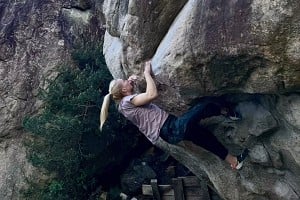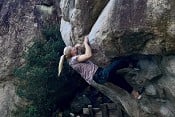In reply to jonnie3430:
Haven't posted on here in ages Jonnie, but since it's you...
I've had the same thing a few times. I'll try and put it a different way, to see if it matches your experience.
Over the years I've had plenty of scary runouts - times where there's been no, or very poor gear and I've weighed up the consequences of a fall, then gone for it. I'm usually quite intense and focussed in this state.
Then, there's been other times when I've just felt calm, focussed, flowing. In this state I can run it out even when I don't need to, for speed, for fluidity. This state is more rare, but it's addictive.
Now, onto the third state which I think is the one you refer to. At times, usually when I've not been climbing so frequently but I am still reasonably fit and strong I will catch myself in a dodgy situation and suddenly it will "click" in my head that I've unwittingly climbed myself into a serious cul-de-sac. The worst thing about this state is that it's not finely tuned, calculated risk. It's blind drifting and lazy thought. It seems to happen more when the climbing is not hard enough to really focus the mind, but still quite sketchy. Your example of ice-choked cracks which you couldn't be bothered to clear fits it perfectly.
If this seems similar to your experience then I think you should really focus on good protection for the next few routes. Don't worry about being a little slow, clearing, searching, scraping and finally placing gear are half the battle in Scotland. There's no harm in running out past poor gear to find better gear, but when you do, make sure you're fully focussed and not just drifting.
And stop bloody falling off with sharp pointy things on your feet!









